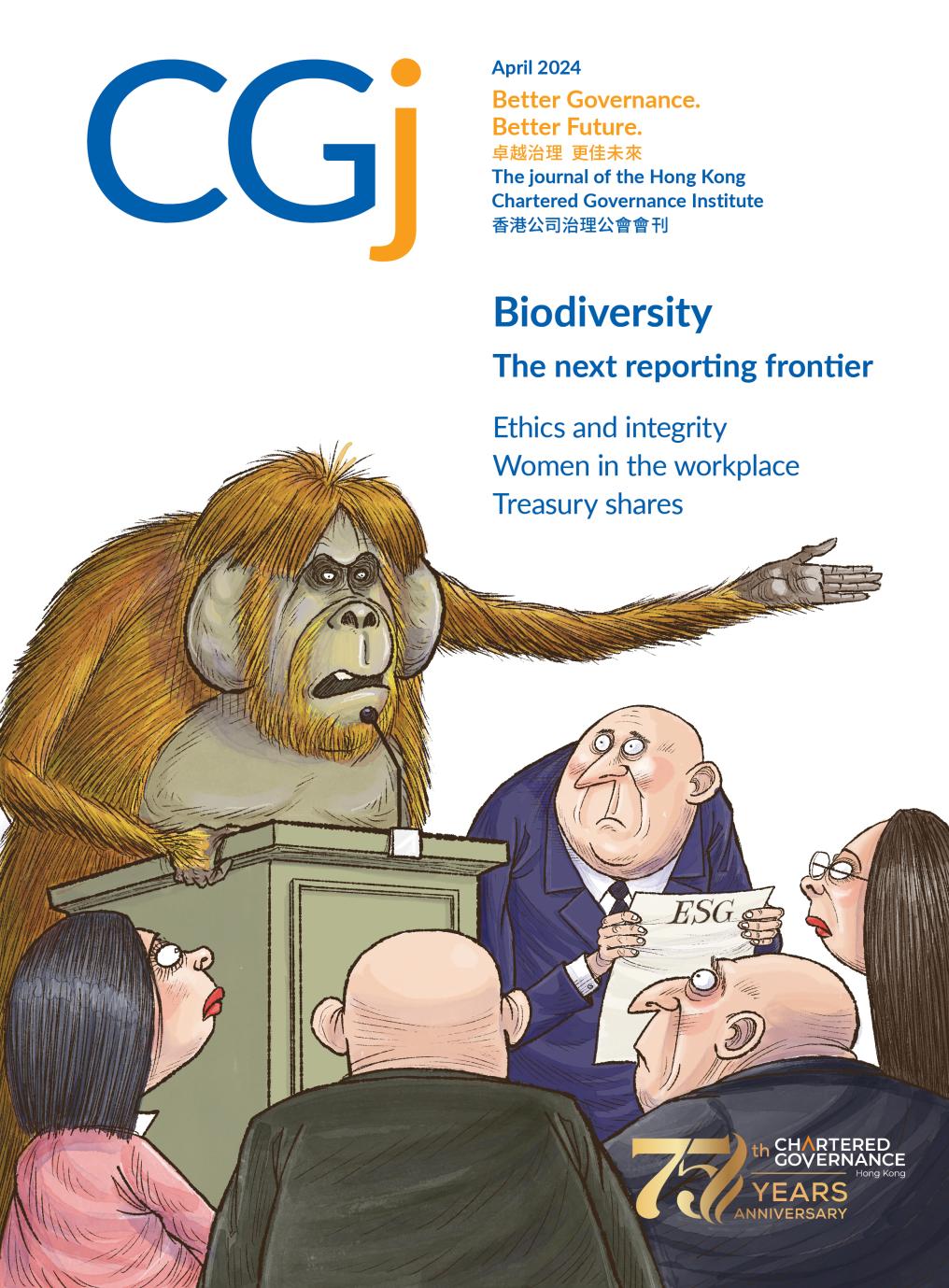In the second and final part of this article, CGj continues its review of a recent Institute seminar discussing Hong Kong’s proposed new treasury share regime, offering practical tips and considerations to help governance professionals prepare for these changes.
Highlights
- listed companies should first check whether their articles of association contain any provisions prohibiting the company from holding or using treasury shares
- the new regime will offer the issuer greater flexibility and efficiency in adjusting the company’s capital structure, potentially reducing the cost of capital, as well as benefiting the existing shareholders
- it is worth evaluating whether your company should set up an independent board committee to look at share repurchases and whether this would be an appropriate move for your business
Hong Kong Exchanges and Clearing Ltd (HKEX) is currently proposing to remove the requirement under Rule 10.06(5) of the Listing Rules to automatically cancel repurchased shares, and to allow a listed issuer to hold those shares in treasury for later sale or reuse in a share scheme, if authorised to do so by the laws of their place of incorporation and their constitutional documents.
Billy Wong, Partner at global law firm Morgan, Lewis & Bockius – who had been invited to speak at the Institute’s recent seminar on HKEX’s proposed amendments to the Listing Rules in relation to treasury shares – provided a number of practical tips to help governance professionals prepare for the changes to come.
Practical tips
Mr Wong recognised that some of the practical tips he was outlining would already be an integral part of the daily working life of a governance professional, while others would be more specific to the proposed amendments.
However, he recommended that the first thing to do, even before the amendments are put in place, is for listed companies to check their articles of association. If they currently contain any provisions prohibiting the company from holding or using treasury shares, they will need to be amended. This is particularly important if you are a Hong Kong incorporated company as, even after the Listing Rule proposals are implemented, the Companies Ordinance will not yet have been updated to reflect the new regime – and this is something that Hong Kong incorporated companies, as opposed to those companies incorporated in overseas jurisdictions that do allow treasury shares, will need to wait for, subject to the provisions of their articles.
Effective date of the change. As with any Listing Rule change, keep an eye on the effective date of the change and whether there will be any applicable transitional arrangement.
Training. This is a priority for everyone involved, including the directors who will be responsible for approving any resolution to allow for share repurchases and who will need to understand all the relevant issues, such as the rules related to connected transactions, which will be the same as those for the issuance of new shares under Chapter 14A of the Main Board Listing Rules.
Plan ahead. Advance planning prior to any repurchase or resale is vital.
Avoid misuse. Mr Wong suggested that governance professionals should carefully examine what measures will need to be put in place to prevent any abuse or misuse of the new regime. He emphasised that ‘HKEX’s proposed requirement for listed companies to state their intention in the share repurchase mandate as to whether repurchased shares will be cancelled or held in treasury is pertinent here. It might be worth evaluating whether your company should set up an independent board committee to look at share repurchases and whether this would be an appropriate move for your business.’
Disclosure documents. This will inevitably mean more work in terms of understanding what is expected and preparing the various disclosure documents, but this is necessary in order to comply with the new regime. The duty of disclosure includes the announcement, listing document, next day disclosure return, monthly return and annual report.
General mandate language. This will need to be reviewed carefully and revised in accord with the new situation.
Record-keeping. Maintain a sound system of good record-keeping.
Calculation of shareholding percentages. Mr Wong clarified that treasury shares are excluded from the calculation of shareholding percentages.
HKEX’s proposed requirement for listed companies to state their intention in the share repurchase mandate as to whether repurchased shares will be cancelled or held in treasury is pertinent
Billy Wong
Partner, Morgan, Lewis & Bockius
Practical considerations for the governance professional
Mr Wong was then joined by panellist Polly Wong FCG HKFCG(PE), Company Secretary and Group Financial Controller, Dynamic Holdings Ltd, and chair Wendy Ho FCG HKFCG(PE), Institute Council member and Chairman of the Professional Development Committee, and Executive Director, Corporate Services, Tricor Hong Kong,to discuss a number of practical considerations.
Financial perspective
Apart from the basic need to understand the regulatory requirements from a corporate governance perspective, the financial aspects of the proposed changes are a crucial consideration.
Panellist Polly Wong pointed out that ‘before a company decides to repurchase shares to hold in treasury, it is vital to understand the relevant accounting requirements and accounting treatments. Treasury shares will be excluded from the calculation of earnings per share and the weighted average earnings per share, for example.’ She also discussed the matter of funding requirements: ‘In order to repurchase shares from the market, listed companies not only need to have the funds available, but they also need to project their future funding requirements and capital commitments.’
She went on to explain that using treasury shares as a resource for reselling is not necessarily going to be the most flexible or efficient way to raise capital – the market price and the floating price need to be carefully analysed in advance to ensure that shares are not repurchased at a price higher than the later resale price, taking into account the strict 30-day moratorium periods, impacting both on-market and off-market resales, as set out in the new proposals.
Any decision to repurchase shares and to hold them in treasury until they can later be resold will have to factor in the interests and funding requirements of the company at the time, as well as the potential impact on business performance, as this would affect cash flow. In addition, the interests of shareholders must also be respected, with stringent attention paid to avoid any breach of the Codes on Takeovers and Mergers and Share Buy-backs. This will all involve extra work and extra time, not to mention the extra work involved in fulfilling the disclosure and documentary requirements, which could end up making this more costly.
On the other hand, being able to hold and later resell treasury shares can certainly provide greater flexibility and efficiency for the issuer. Obtaining a mandate from the shareholders for the resale of treasury shares as new shares will be quicker – plus the cost of capital will be reduced – compared with issuing new shares. For the existing shareholders too, the new regime would offer certain benefits. For instance, if they want to invest further in the company, they would be entitled to the same cost discount under the general mandate as for the issuance of new shares.
before a company decides to repurchase shares to hold in treasury, it is vital to understand the relevant accounting requirements and accounting treatments
Polly Wong FCG HKFCG(PE)
Company Secretary and Group Financial Controller, Dynamic Holdings Ltd
Legal perspective
Billy Wong reminded the participants that, from a legal perspective, understanding and following all the Listing Rule disclosure obligations, as well as drafting your intention regarding the treatment of repurchased shares, are paramount in enhancing transparency, as well as enabling shareholders to make informed decisions and understand the potential impact of share repurchases on the company’s capital structure.
Company secretarial perspective
As Wendy Ho advised, because the new regime will mean the company secretary’s workload increases, it is very important to plan ahead and to understand the various disclosure announcements and returns that will need to be made.
If a company has a share award scheme, the issuer can make use of the treasury shares for this purpose, which will enhance efficiency. It could also be a benefit in terms of attracting and retaining talent.
Conclusion
‘We need to make sure that we fully understand what will be required by the amendments, and whether using treasury shares would be of benefit to the company and in the best interests of the shareholders or not,’ Mr Wong stated. ‘It will certainly allow for more flexibility in the sense that if a company can use treasury shares, there will be more options available to achieve the same objectives. But there is a need to balance risk and reward. And there will be risks – there is a reason that Hong Kong did not adopt this system earlier and why this isn’t going to happen overnight. But hopefully any risks can be managed with the new measures being put in place,’ he continued. Careful advance planning is needed to assess what the risks might be and how to mitigate them.
Ms Wong also reiterated the importance of planning and training prior to the implementation of the new treasury share regime, particularly for those from the company secretary and finance teams.
More guidance is likely to be issued by several bodies, including HKEX, the Hong Kong Institute of Certified Public Accountants and the Securities and Futures Commission, before the new regime takes effect.
‘These proposals are just a start, but I do expect the new regime to be implemented. So stay tuned and make appropriate preparations,’ Mr Wong concluded.
Part 1 of this article, which outlined the historical context of the issue and what the proposed changes will mean for listed companies in Hong Kong, was published in last month’s edition of CGj.
The hybrid seminar reviewed in this article – Proposed Amendments to Treasury Share Listing Rules – was held on 11 January 2024. More information on the Institute’s ECPD seminars is available on its website: https://www.hkcgi.org.hk.
Credits
The Institute would like to thank everyone involved in the seminar reviewed in this article.
- Speaker: Billy Wong, Partner, Morgan, Lewis & Bockius
- Panellist: Polly Wong FCG HKFCG(PE), Company Secretary and Group Financial Controller, Dynamic Holdings Ltd
- Chair: Wendy Ho FCG HKFCG(PE), Institute Council member and Chairman of the Professional Development Committee, and Executive Director, Corporate Services, Tricor Hong Kong



